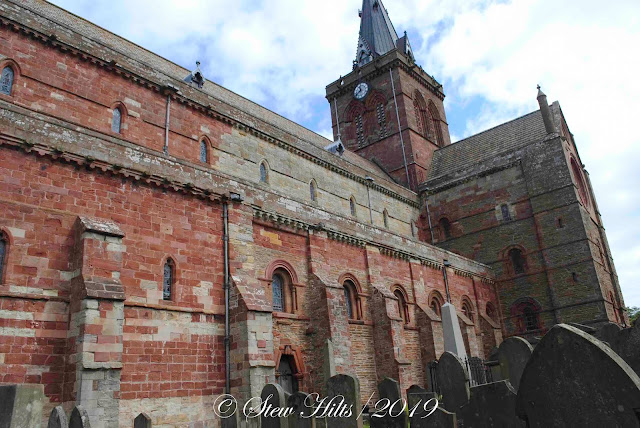In those days Orkney belonged to Norway, not Scotland, and the Earls of Orkney, with their bloodthirsty Viking heritage, killed each other off regularly. Rognvald's uncle, King Magnus,
a very peaceful man who later became a saint, had been traitorously murdered in 1117, and Rognvald became king vowing to build a great church in honour of his uncle,
The bulk of the church, built in the 1100's, is Romanesque in style, with rounded arches over all the windows. Stonemasons who had built other cathedrals in England and Scotland worked here.
This window and door are perhaps one of the most stunning examples of Romanesque architecture with the contrasting stone colours surviving in Britain. How many of today's buildings will be still standing and looking beautiful in 900 years?
There are also two beautiful rose windows high in the walls. The churchyard, as is typical with older churches, is a graveyard. The steeple on top has replaced an earlier shorter one.
In contrast, though most visitors might not notice, the west façade and main entrance are much younger, only about 500 years old! This door is distinctly gothic in style with its pointed arch, rather than Romanesque.
The cathedral is built of red and yellow sandstone, and here you can see how it does gradually erode over the centuries.
Kirkwall in Orkney is a fascinating place, with a harbour still devoted to fishing. When we were there lobster pots and marker buoys decorated the docks. Our ship is in the background.
Orkney is often referred to mistakenly (even by myself) as 'the Orkneys'. It is an archipelago of about 70 islands off the northeast corner of Scotland in the North Sea. Confusingly to visitors, the largest island with the capital, Kirkwall, is called 'Mainland'. Tomorrow the stunning Neolithic sites on the island.











Thank you for delving back into your archives to bring us this post. A fascinating place and one that I always intended to visit but never have. I've read a bit about the Neolithic sites though and look forward to seeing your photographs of that adventure.
ReplyDeleteThank you for sharing this post. My maternal grandmother's roots are in Kirkwall. Her father was from a long line of stone masons. He and several siblings came to the Peterborough area. The brothers were all master craftsmen. (I am presuming the only sister who came with was sent along to look after them.) I see my great grandfather was greatly influenced by this cathedral. Numerous features from it's facade can be seen on many of the churches he helped build in Peterborough. He was a founder of our home church, St. Paul's Presbyterian. He duplicated a lot of this cathedral in that building. (Unfortunately under the wreckers ball these days.)
ReplyDeleteMy grandmother had many stories. She said we were descended not only from Vikings, but the family of St. Magnus himself! It was her stories that led me to do my first DNA test, which verified that I am in fact of Scandinavian/Scottish lineage.
Very interesting post and looking forward to the next. C
ReplyDeleteMy mother came from Scotland, just south of Glasgow, in a small place called Cambuslang.When Hugh was in hospital once, I talked to a lady in the opposite bed, she had a distinct Scottish accent. I mentioned Cambuslang, and she replied, " You are the first person here in NZ to know where that is, and I met my husband there at the train station". Orkney, wind and water power, electric cars, and so lovely to read Karen's words, another blogger with roots over there.
ReplyDelete"How many of today's buildings will be still standing and looking beautiful in 900 years?" Darn few, if any.
ReplyDeleteThe cathedral is impressive!
ReplyDeleteI do so want to visit Scotland. It gets more fascinating with every article and blog.
ReplyDeleteLovely post and photos . I do enjoy historical information . I have family in Scotland but have never been there it one of my things to get done on my bucket list .
ReplyDeleteI don't think anything standing right now will be around in a thousand years, other than maybe these fine structures. Thanks for the history lesson with pictures. :-)
ReplyDeleteArt kisses architecture
ReplyDeleteWOW that is some beautiful building. Fabulous detail. Amazingly old too.
ReplyDeleteAnd we even got a history lesson. : )
Such beauty. Interesting point about the erosion.
ReplyDeleteHow amazing. I wish I liked to travel.
ReplyDelete